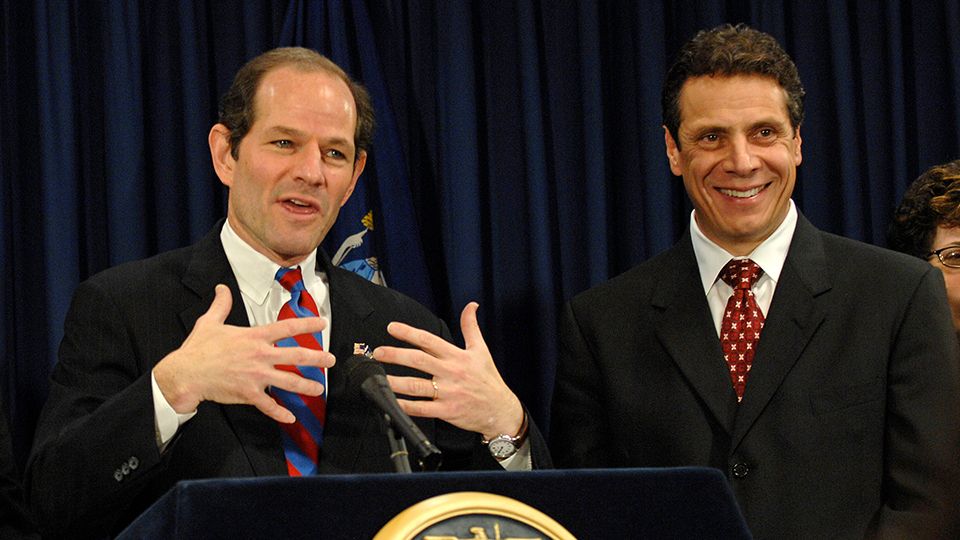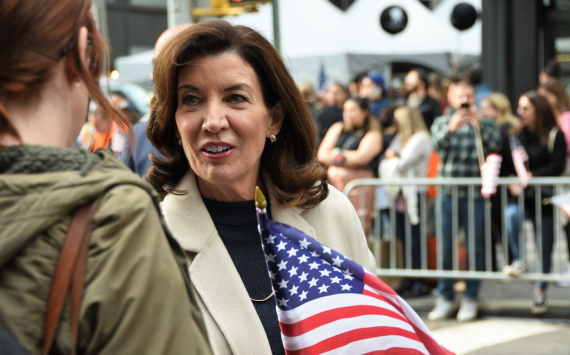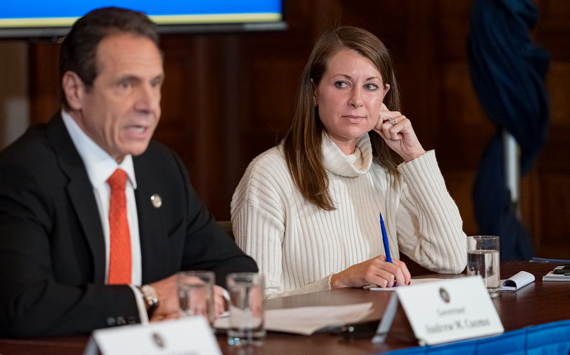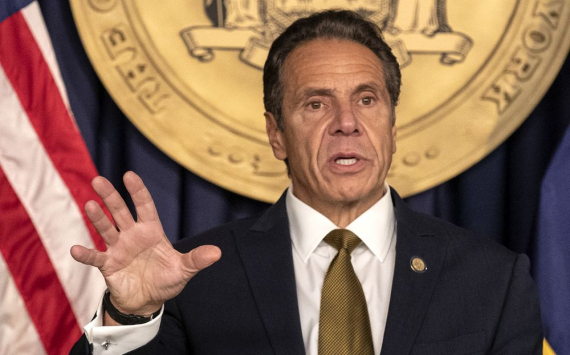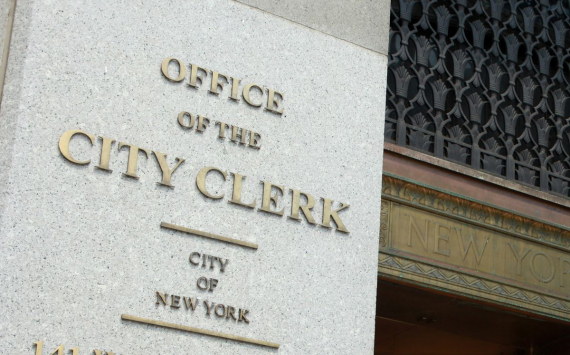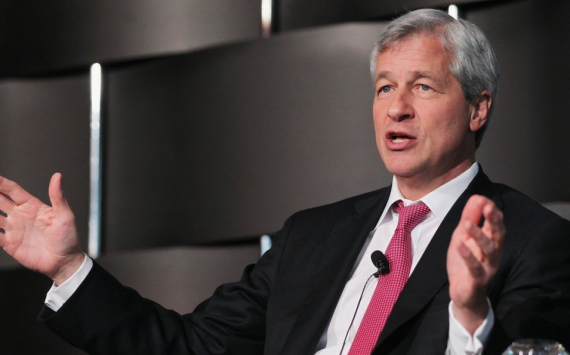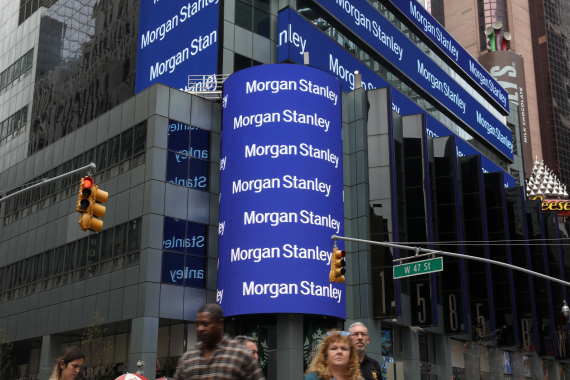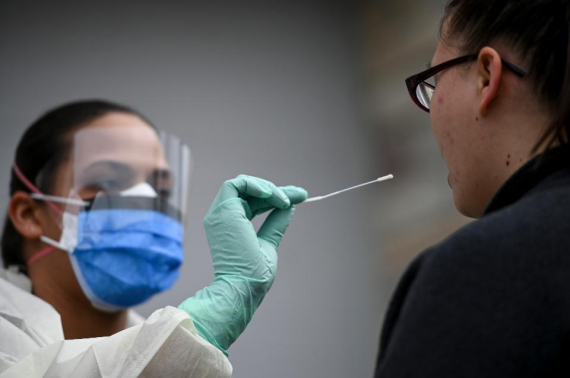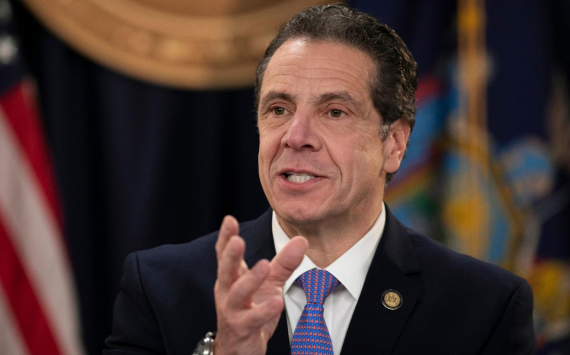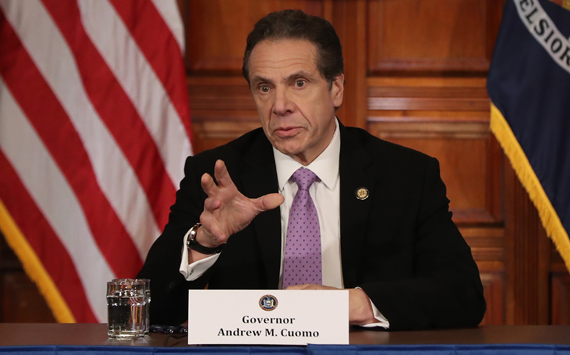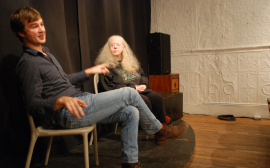- 1. Early Life
- 2. Early Career
- 3. Secretary of HUD
- 4. 2002 New York gubernatorial election
- 5. New York attorney general
- 6. Potential U.S. Senate appointment
- 7. Gubernatorial elections
- 8. Governor of New York
- 8.1. Corporate incentives
- 8.2. COVID-19 pandemic response
- 8.3. Criminal justice
- 8.4. Environment
- 8.5. Gun control
- 8.6. Marijuana legalization
- 8.7. Public college and university tuition
- 8.8. Public housing
- 8.9. Women's issues and abortion
- 9. Personal Life & Legacy
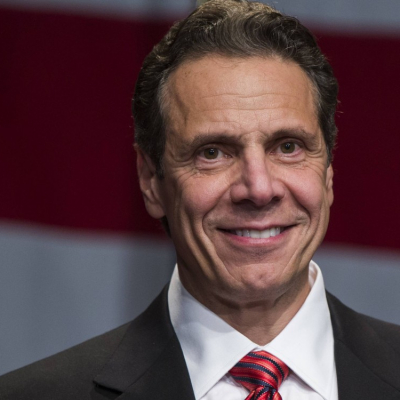
CUOMO
Andrew
Mark
Governor of New York
Date of Birth: 6 December 1957
person_view.holiday: St. Nicholas Day
Age: 67 years old
Place of Birth: Queens, New York City
Height: 180
Weight: 90
Zodiac sign: Sagittarius
Profession: Politician
Biography
Andrew Mark Cuomo (12.06.1957) is the current governor of New York. He is the 56th governor of New York. Apart from being a politician, Andrew is also a lawyer and an author.
Early Life
Andrew Mark Cuomo was born on December 6, 1957 in Queens, New York. He is the eldest son of attorney and later governor of New York, Mario Cuomo, and his wife, Matilda, both Italians. He has a younger brother, Chris, who works as a journalist with ‘CNN.’
Andrew attended St. Gerard Majella’s School, from where he graduated in 1971. In 1975, he finished Archbishop Molloy High School. Soon, he entered Fordham University. He graduated with a BA degree from there in 1979. Then he went to Albany Law School of Union University, New York, to receive a JD.
He became interested in politics since he was a teenager, when he participated in his father’s campaign to run for the state office. He put up posters during the campaign to support his father.

Cuomo working in his father's campaign
Early Career
After finishing law school in 1982, Andrew’s first job was to work as the campaign chief executive for his father, who was running for the post of governor. Mario Cuomo won the position and remained the governor from 1983 to 1994. Andrew worked as the senior advisor in his father’s office for the next two years. He only earned $1 per year but worked strenuously and gave his best to the job.
In 1984, Andrew came to New York and started working as an assistant district attorney. He also partnered with a law firm named ‘Blutriche, Falcone and Miller’ for a short period of time. Although he moved away from his father’s office, that didn’t stop him from helping his relative. He continued giving quality advice to his father’s administration. During this, Andrew began paying attention to the adversities suffered by the under-privileged classes of society. Andrew started ‘Housing Enterprises for the Less Privileged’ (HELP) for the homeless in the city where he lived. The organization was established in 1986, and by 1988, Andrew left his job at the law firm to focus completely on ‘HELP.’ His dedication toward the uprising of the homeless also made him the chairperson of the ‘New York City Homeless Commission’ in 1990, under the administration of New York mayor David Dinkins. He remained the chairperson until 1993 and was responsible for taking care of the issues of the homeless people in the city and for developing policies for their benefit.
Another opportunity turned up after Bill Clinton was elected as the new president of the US in 1992. Andrew was appointed as the assistant secretary for ‘Community Planning and Development’ under the ‘US Department of Housing and Urban Development’ (HUD) in 1993. After Clinton’s election, Andrew came to Washington DC to help with the transition to the new administration. It was soon confirmed that he would himself play a role in the administration.
He worked closely with the by-gone vice president of the US, Al Gore, to formulate policies that provided permanent homes to the poor and the homeless. In 1997, an announcement stated that Andrew would be the new secretary of ‘HUD.’
He remained in that employment until the end of Clinton’s administration in 2001. During his time as the secretary of ‘HUD,’ Andrew worked toward the control of gun use by negotiating with ‘Smith & Wesson,’ the largest handgun manufacturer, and forced them to change the design and distribution strategy of their guns.
Also, Andrew was focused on generating employment and improving the economy. Many were convinced that Andrew was obsessed with completely changing the image of ‘HUD,’ while many were of the opinion that he was only a contributor, a cheerleader who could not be blamed for everything.
In 2002, he ran for governor as a ‘Democratic’ candidate in the gubernatorial election, but his comment about George Pataki being a great assistant but not a leader turned the tables. From being the favorite nominee, he went downhill, and he himself removed his name from consideration, on the eve of the state convention. Herman Carl McCall, the ‘Democratic’ candidate who contested the election eventually, lost it to Pataki.
Secretary of HUD

Cuomo as HUD Secretary
Andrew Cuomo was appointed to the Department of Housing and Urban Development (HUD) as Assistant Secretary for Community Planning and Development in 1993, a member of President Bill Clinton's administration. After the departure of Secretary Henry Cisneros at the end of Clinton's first term under the cloud of an FBI investigation, Cuomo was by a solid vote of the US Senate confirmed to succeed him as Secretary of HUD. Cuomo served as Secretary from January 1997 until the Clinton administration ended in 2001.
In 2000, Cuomo led HUD efforts to negotiate an agreement with United States handgun manufacturer Smith & Wesson. This agreement required the company to change the design, distribution, and marketing of guns to make them safer and to help keep them out of the hands of children and criminals. Budgets enacted during Cuomo's term contained initiatives to increase the supply of affordable housing and home ownership and to create jobs and economic development. These included new rental assistance subsidies, reforms to integrate public housing, higher limits on mortgages insured by the Federal Housing Administration, a crackdown on housing discrimination, expanded programs to help homeless people get housing and jobs, and creation of new empowerment zones.
According to libertarian author and critic James Bovard, Cuomo was obsessed with changing HUD's image, as Cuomo declared
"PR is the important thing I do... Eighty percent of the battle is communications."
He championed a new program called Community Builders, created without appropriation by Congress, for 800 new HUD employees with computers to be paid as much as $100,000. In a June 16, 1999, speech, Cuomo declared that one purpose of the program was to fight against HUD's abolition. In August 1999, Community Builders distributed a letter to community groups to fight against proposed tax cuts. One HUD official declared that Community Builders were seen as "Democratic ward heelers who act as a pipeline between Democratic city officials, party leaders, and the administration and the Democratic National Committee."
In 1998, Clinton-appointed HUD inspector general Susan Gaffney testified to a Senate committee that she was the victim of "'escalating' attacks on her office by Cuomo and 'his key aides,' including cooked-up charges of racism, insubordination, malfeasance, and general dirty-dealing." In 1999, Gaffney's office concluded that "most Community Builders' goals were activities rather than actual accomplishments" and that Cuomo's initiatives "had a crippling effect on many of HUD's ongoing operations." Gaffney retired in May 2001, shortly after the department reached a $490,000 settlement with a black employee who had accused her of racial discrimination in passing him over for a promotion.

Cuomo as HUD Secretary holding a press conference with then Treasury Secretary Larry Summers in June 2000
Prior to Cuomo's tenure, HUD was routinely included on the General Accounting Office's biannual watch list of government programs whose poor management made them prone to fraud. During his time in office, two of HUD's four main departments were removed from the GAO list. In addition, the department cut 15 percent of its staff as part of a Cuomo initiative to streamline its operations.
2002 New York gubernatorial election
Cuomo first ran for the Democratic nomination for Governor of New York in 2002. He was initially the favorite for the nomination and led in fund-raising and polls, but his campaign took serious damage after a gaffe when Cuomo said (in reference to the aftermath of the September 11 attacks): "Pataki stood behind the leader. He held the leader's coat. He was a great assistant to the leader. But he was not a leader. Cream rises to the top, and Rudy Giuliani rises to the top." His remarks were widely derided; even his father, former governor Mario Cuomo, later admitted it was a blunder.
On the eve of the state convention, Cuomo withdrew from consideration after concluding that he had little chance of support against the favored party candidate, State Comptroller Carl McCall. McCall went on to lose the general election to incumbent George Pataki.
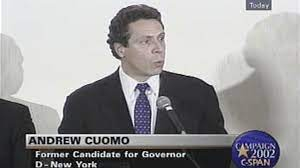
Cuomo with his withdrawal announcement in 2002
New York attorney general
Election
Cuomo declared his candidacy for the Democratic nomination for New York State attorney general in 2006 and on May 30, 2006, captured the Democratic Party's endorsement, receiving 65% of the delegates. Though Cuomo won the endorsement, former New York City public advocate Mark J. Green and two-time candidate for Lieutenant Governor Charlie King also earned places on the Democratic ballot. King dropped out of the race before the primary and endorsed Cuomo.
Cuomo won the primary with a majority of the vote, defeating his nearest opponent by over 20%. Clinching the Democratic party nomination was considered a significant rebound following his unsuccessful and unpopular 2002 gubernatorial campaign, and at the nominating convention June O'Neill, the Democratic chairwoman of St. Lawrence County, called him "New York's own Comeback Kid." In the general election on November 7, 2006, he defeated the Republican nominee, former Westchester district attorney Jeanine Pirro, winning 58% of the vote.
Tenure
Police surveillance, 2007
On July 23, 2007, Cuomo's office admonished the Spitzer administration for ordering the New York State Police to keep special records of then Senate majority leader Joseph Bruno's whereabouts when he traveled with police escorts in New York City. At the discretion of top officials of the Spitzer administration, the created documents meant to cause political damage to Bruno. Spitzer responded by accepting responsibility and issuing an apology to Bruno.
Cuomo and Spitzer
Student loan inquiry, 2007
In 2007, Cuomo was active in a high-profile investigation into lending practices and anti-competitive relationships between student lenders and universities. Specifically, many universities steered student borrowers to a "preferred lender," which resulted in the borrowers' incurring higher interest rates. This led to changes in lending policy at many major American universities. Many universities also rebated millions of dollars in fees to affected borrowers.
On June 10, 2008, Cuomo announced that three major Internet service providers (Verizon Communications, Time Warner Cable, and Sprint) would "shut down major sources of online child pornography" by no longer hosting many Usenet groups. Time Warner Cable ceased offering Usenet altogether, Sprint ended access to the 18,408 newsgroups in the alt. hierarchy, and Verizon limited its Usenet offerings to the approximately 3,000 Big 8 newsgroups. The move came after Cuomo's office located 88 different newsgroups to which child pornography had been posted.
2008 Obama remarks
In 2008, Cuomo said of the Democratic Party candidate Barack Obama, who was running against Hillary Clinton, the candidate Cuomo supported:
"You can't shuck and jive at a press conference." Cuomo received criticism from some for his use of the phrase. Roland Martin of CNN said that "shuckin' and jivin' have long been words used as a negative assessment of African Americans, along the lines of a 'foot-shufflin' Negro."

Cuomo with Representative Gary Ackerman in October 2008
Corruption and fraud investigations, 2009
Cuomo investigated a corruption scandal, a "fraudulent scheme to extract kickbacks," which involved New York investigators, the Securities and Exchange Commission, and attorneys general in dozens of states.
Also in 2009, Cuomo launched a suit against the United Homeless Organization, a New York charity. He charged that the majority of the group's income was not used to provide services to the homeless but was diverted to the founders for unrelated personal expenses. In 2010, Judge Barbara R. Kapnick granted the judgement and forced the group to disband.
Potential U.S. Senate appointment
Cuomo with Bill Clinton in 2012
After Hillary Clinton became President Obama's choice for U.S. Secretary of State, then New York governor David Paterson was charged with appointing a temporary replacement until a special election. Cuomo was seen as a leading contender for this appointment. Caroline Kennedy (who is a first cousin of Cuomo's ex-wife) was another leading contender, but withdrew for personal reasons two days before Paterson was set to announce his choice, leaving Cuomo and U.S. representative Kirsten Gillibrand as the most likely appointees. On January 23, Paterson announced he would appoint Gillibrand to the U.S. Senate.
Gubernatorial elections
2010
On September 18, 2009, advisors to President Barack Obama informed Governor David Paterson that the president believed he should withdraw his 2010 gubernatorial candidacy, stepping aside for "popular Attorney General Andrew Cuomo." On January 23, 2010, the New York Daily News reported that Cuomo would announce plans for a gubernatorial campaign at the end of March. Later reports indicated Cuomo would announce his gubernatorial campaign coinciding with the state Democratic Convention in late May. On May 22, 2010, Cuomo announced his run for governor in a video posted to his campaign website. Cuomo announced his choice for lieutenant governor on May 26, 2010: Robert Duffy, Mayor of Rochester.
In the November 2, 2010, general election, Cuomo faced Republican Carl Paladino, a Buffalo-based businessman who had been heavily supported by the Tea Party movement. Cuomo won the election for governor by a landslide, winning 62.6% of the vote. Paladino performed strongly in his native Buffalo area, while Cuomo performed well in the eastern part of the state as well as downstate.
In addition to the parties fielding candidates, New York's electoral fusion laws allow parties to cross-endorse candidates. The Independence Party and Working Families Party cross-endorsed Andrew Cuomo, while the Conservative Party and Taxpayers Party cross-endorsed Carl Paladino. The Independence Party line received 146,648 votes (5.0% of Cuomo's total, and 3.2% of the statewide total) and the Working Families line received 154,853 votes (5.3% and 3.4%), with the Democratic line receiving the remaining 2,610,220 votes (89.6% and 56.5%). The Conservative line received 232,281 votes (15.0% of Paladino's total, and 5.0% of the statewide total) and the Taxpayers line received 25,821 votes (1.5% and 0.6%), with the Republican line receiving the remaining 1,290,082 votes (83.3% and 27.1%).
2014
Cuomo sought reelection in 2014, with former U.S. Representative Kathy Hochul as his new running mate. On March 5, 2014, Westchester County executive Rob Astorino announced that he would run on the Republican ticket against Cuomo for governor. Law professors Zephyr Teachout and Tim Wu challenged the Cuomo–Hochul ticket in the Democratic primary election — capturing 34% of the vote on the gubernatorial line (Wu drew 40.1% as lieutenant governor). On November 4, 2014, Cuomo was reelected for a second term with 54% of the vote, while Astorino received 40.6% of the vote.
Despite low voter turnout, Cuomo won the general election by a comfortable margin; however, his margin of victory was smaller than it had been in his 2010 victory. Astorino won most of upstate New York but was overwhelmed in New York City. Cuomo was sworn in for his second term as governor.
2018
Cuomo was challenged in the primary from the left by actress and activist Cynthia Nixon. She criticized him for having failed to fix the New York City Subway following his declaration of the 2017 New York City transit crisis as well as for not protecting undocumented immigrants, not legalizing recreational marijuana and not creating a single-payer healthcare system. When debating Nixon, Cuomo countered her argument on the subways by pointing out that the system is owned by New York City, though past administrations agree it is the governor's role. An analysis conducted by New York City comptroller Scott Stringer revealed that New York City pays for 70 percent of subway repair costs.
Cuomo defeated Nixon, 65.53%-34.47%.
On November 6, 2018, the Cuomo-Hochul ticket defeated the Molinaro-Killian ticket by a margin of 59.6% to 36.2%.
On March 19, 2021, The New York Times, in an episode of their podcast The Daily, leaked audio of Cuomo threatening Bill Lipton, head of the Working Families Party, which had endorsed primary opponent Nixon, that
"if you ever say, 'Well he's better than a Republican' again, then I'm gonna say, 'You're better than a child rapist.'"

Cuomo leading the 2018 New York City March For Our Lives rally
Governor of New York
Cuomo took the gubernatorial oath of office at 12:01 a.m. on January 1, 2011, succeeding David Paterson. During his first year as governor, Cuomo worked to pass an on-time budget that cut spending without raising taxes, made a new deal with a large state-employee union, signed ethics reform legislation, passed a property tax cap, worked to enact a same-sex marriage bill with bipartisan support, and restructured New York's tax code.
There was media speculation about a possible presidential run, either in 2016 or 2020. Several reports indicated that Cuomo supported the Independent Democratic Conference until its dissolution and defeat in 2018 in part to appear more moderate for an eventual presidential bid.
For his 2018 re-election bid, Cuomo accepted being on top of the ballot line for the Independence Party, a list that featured numerous Republicans, including ardent Trump supporters.
In an August 15, 2018, anti-sex trafficking bill-signing event, Cuomo said:
"We're not gonna make America great again. It was never that great. We have not reached greatness. We will reach greatness when every American is fully engaged."
The assembled audience of Cuomo's supporters booed.
In a February 2019 opinion poll, Cuomo's approval rating dropped to 43 percent, the lowest of his tenure as governor, and a full 50% said they disapproved. The poll showed an eight percent drop from January 2019; it was taken after Cuomo signed several pieces of progressive legislation, including an expansion of abortion rights and access and stricter gun laws, suggesting that the legislation may have upset certain voters and contributed to the drop; however, the majority of voters agreed with his position on both issues. By early 2020, Cuomo's favorability rating was up to 77 percent, a record high.
Corporate incentives
Cuomo has supported providing tax and other incentives to attract business to locate in New York State. He even joked in 2018 that he would be willing to change his name to "Amazon Cuomo" if Amazon located their "Amazon HQ2" in the state. His strong support for New York City's bid to become the home of Amazon's HQ2 faced criticism based on arguments that the costs to the state outweighed the possible benefits. Amazon decided on two "major corporate outposts," in New York City and Arlington, Virginia, instead of a single second headquarters, before bowing out of the former under local pressure.
COVID-19 pandemic response
On March 1, 2020, Cuomo issued a statement regarding novel coronavirus in New York wherein he mentioned the first positive case of novel coronavirus in New York State. On March 2, 2020, Cuomo said that community transmission of the new coronavirus is "inevitable". He also mentioned New York City's plans to aggressively ramp up diagnostic testing for the new virus and said that he would like to see New York City conducting "1,000 tests per day". He announced the "world-renowned" Wadsworth Center was partnering with hospitals to expand surge testing capacity to "1,000 tests per day statewide" for the novel coronavirus. On March 3, 2020, Cuomo signed a $40 million emergency management authorization for coronavirus response and claimed that "New York's overall risk remained low". He also announced the institution of a new cleaning protocol at schools and in the public transportation system "to help stop any potential spread of the virus". On March 4, 2020, Cuomo confirmed nine new cases in the state and said that it was "literally like trying to stop air" and reaffirming that it was inevitable that it would continue to spread.
On March 6, 2020, Cuomo criticized the federal government's response to the COVID-19 outbreak, calling it "absurd and nonsensical".
Early in the coronavirus response efforts, Cuomo received widespread praise from epidemiologists for his handling of the evolving COVID-19 pandemic in New York State, which included a statewide lockdown and a shutdown of nonessential businesses in an effort to help flatten the curve of the virus. Like many other national leaders, however, Cuomo also received criticism for failing to grasp the gravity of the pandemic before its risks were fully visible to the American public.
On March 28, 2020, Cuomo threatened Rhode Island with a lawsuit over a new state quarantine policy of stopping incoming New Yorkers to enforce quarantine.
In the spring of 2020, social media posters and television hosts such as Stephen Colbert, Trevor Noah, and Ellen DeGeneres came up with the term "Cuomosexuals" to express admiration and love for the governor and his brother, CNN anchor Chris Cuomo, related to their leadership roles during the COVID-19 pandemic.
In November 2020, Cuomo received the International Emmy Founders Award from the International Academy of Television Arts and Sciences for his daily coronavirus briefings.

Cuomo speaking about COVID-19
Over the course of the COVID-19 pandemic in his state, nine state health officials resigned, reportedly in response to Cuomo's policies. In a press conference on January 29, 2021, Cuomo stated that he did not trust the expertise of health officials.
In October, Cuomo wrote a book, American Crisis, proclaiming victory against the pandemic due to his leadership. He wrote that New York "confronted and defeated" the virus. By February 2021, New York had the highest per capita hospitalization rate in the country.
On June 15, 2021, Cuomo lifted COVID-19 restrictions, following the news that 70% of adults have had one shot of the COVID-19 Vaccine.
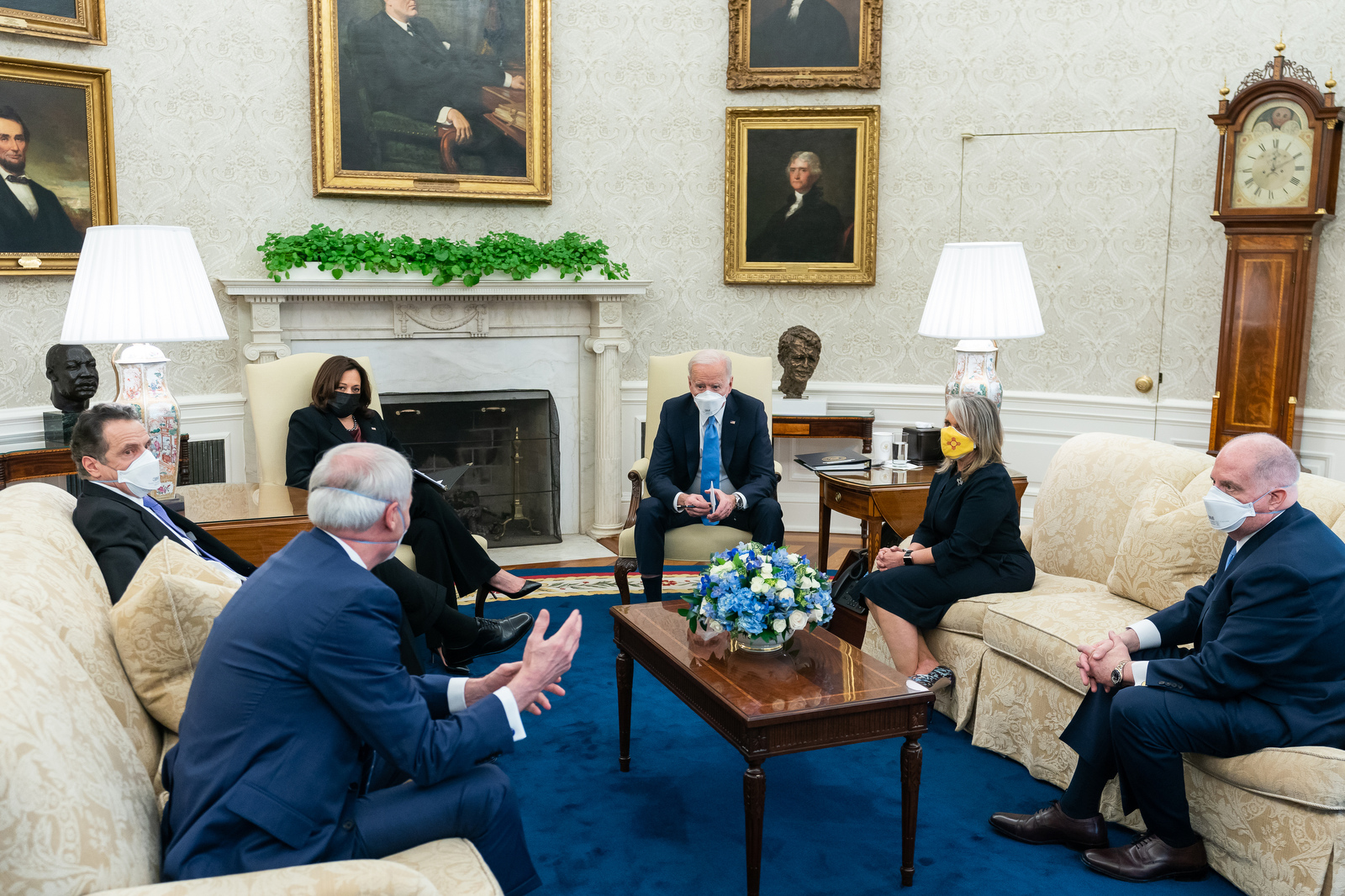
Cuomo meeting with President Joe Biden, Vice President Kamala Harris, and a bipartisan group of governors and mayors in 2021
Criminal justice
In August 2017, the Cuomo administration awarded more than $7 million, financed with money from large bank settlements, in grants to New York colleges to offer courses to New York prisoners. In January 2018, Cuomo proposed reforms that would "reduce delays during trials, ban asset seizures in cases where there has been no conviction and make it easier for former convicts to get a job after leaving prison." He also called for an end to cash bail for minor crimes.
Under Cuomo's tenure, he granted commutations to fewer prisoners than many previous Republican and Democratic New York governors. Cuomo commuted a total of nine sentences. Cuomo pardoned 140 adults who were convicted of nonviolent felonies as 16- and 17-year-olds, but had served their sentences. He pardoned 18 others who had served their sentences for nonviolent felonies but were exposed to deportation due to their criminal record.
Environment
In 2017, Cuomo announced that the Indian Points nuclear plant, which produced one quarter of New York City's power, would be phased out. As a result of the phaseout, the carbon-free power generated by the plant was replaced by power generated by carbon-generating fossil fuels. As a consequence, New York was estimated to struggle to meet its climate goals.
Gun control
On January 15, 2013, Cuomo signed into law the first state gun control bill to pass after the December 14, 2012, Sandy Hook Elementary School shooting in neighboring Connecticut. The NY SAFE Act was described as the toughest gun control law in the United States. The act came under criticism, and the National Rifle Association called it draconian. The New York State Sheriffs' Association issued a statement supporting tougher penalties for illegal use of firearms but criticizing several aspects of the legislation, including a magazine limit of seven rounds and a "too broad" definition of assault weapons.
On July 5, 2013, Cuomo signed an amendment to the NY SAFE Act that exempts retired police officers from some of the act's ownership restrictions.
Marijuana legalization
In January 2014, Cuomo announced an executive order to allow the limited use of medical marijuana in New York. Later that year, a comprehensive bill to legalize medical cannabis was passed by the state legislature, containing some restrictions at Cuomo's insistence such as a ban on consumption by smoking. On July 5, 2014, the Compassionate Care Act was signed into law by Governor Cuomo.
In December 2018, Cuomo announced his support for legalizing the recreational use of cannabis, after previously stating his opposition and calling it a "gateway drug" as recently as February 2017. On March 31, 2021, recreational use of cannabis was officially legalized with the signing into law of the Marijuana Regulation and Taxation Act.
Public college and university tuition
On April 18, 2017, Cuomo signed the New York State 2018 fiscal year budget. It included the Excelsior Scholarship, a provision that families making less than $125,000 in 2019 could have free tuition at all SUNY and CUNY universities, though some education experts including Sara Goldrick-Rab say it won't help the poorest students and that the requirement that recipients live and work in New York after graduating is counter-productive.
Public housing
In the winter of 2018, Cuomo responded to a class-action lawsuit brought against the New York City Housing Authority by attorney Jim Walden on behalf of a group of public housing tenants. The suit was the first of its kind and called upon NYCHA to immediately address decrepit and unhealthy conditions in public housing units across New York City. At the invitation of Walden, Cuomo toured a public housing project in March. By early April, Cuomo appointed an independent monitor to oversee NYCHA on an emergency basis. The move broadened the ever-widening rift between NYC mayor Bill de Blasio and Cuomo.
Women's issues and abortion
In 2013, Cuomo called for the passage of a Women's Equality Act. The Women's Equality Act included 10 component bills affecting issues such as domestic violence, human trafficking, and pregnancy discrimination. The tenth bill of the Women's Equality Act was the Reproductive Health Act, which would have "enshrined in state law existing federal protections for abortion rights," "shifted the state's abortion law from the criminal code to the health care laws," and "made it clearer that licensed health care practitioners as well as physicians could perform abortions." During his 2013 State of the State address, Cuomo said, "Enact a Reproductive Health Act because it is her body, it is her choice. Because it's her body, it's her choice. Because it's her body, it's her choice." The New York State Assembly passed the Women's Equality Act on June 20, 2013. The Republican leadership of the New York State Senate expressed support for the nine non-abortion-related planks of the Women's Equality Act, but objected to the Reproductive Health Act and expressed unwillingness to allow a vote on it.
On the final day of the 2013 legislative session, following the Senate Republican Conference's continued refusal to vote on the full Women's Equality Act, Senator Jeff Klein, leader of the Independent Democratic Conference (IDC), offered the abortion plank of the Act as a hostile amendment to another bill. The amendment was defeated by a narrow margin of 32–31; all 30 Senate Republicans voted against the abortion amendment, as did Democratic Sens. Ruben Diaz and Simcha Felder. The Senate proceeded to pass the nine non-abortion-related planks of the Women's Equality Act as separate bills, and the 2013 legislative session came to an end without any portion of the WEA becoming law.
"After the 2014 election season was over, with Cuomo victorious, the governor and his lieutenant governor Kathy Hochul both declared the abortion plank of the act officially dormant, if not dead."
In 2015, the non-abortion-related Women's Equality Act bills passed both houses of the State Legislature. In October 2015, Cuomo signed eight of the 10 Women's Equality Act bills into law; the abortion rights bill was not among them.
On January 22, 2019, Cuomo signed the 2019 version of the Reproductive Health Act, which passed days after Democrats took control of the state Senate. Cuomo ordered One World Trade Center and other landmarks to be lit in pink to celebrate the bill's passageю Cuomo's signing and the lighting of the World Trade Center building sparked intense criticism from conservatives. The Catholic cardinal Timothy Dolan criticized Cuomo over the Reproductive Health Act.
Personal Life & Legacy

Cuomo with Sandra Lee and his daughters from his previous marriage
Cuomo married Kerry Kennedy, the seventh child of Robert F. Kennedy and Ethel Skakel Kennedy, on June 9, 1990. They have three daughters: twins, Cara Ethel Kennedy-Cuomo and Mariah Matilda Kennedy-Cuomo (born 1995), and Michaela Andrea Kennedy-Cuomo (born 1997). They separated in 2003, and divorced in 2005.
Cuomo began dating Food Network host Sandra Lee in 2005, and the couple moved in together in 2011. The two resided in Westchester County, New York. On September 25, 2019, the couple announced that they had ended their relationship. As of the fall of 2019, Cuomo is living in the New York State Executive Mansion in Albany on a full-time basis.
Cuomo is a Roman Catholic. According to The New York Times, Cuomo's positions in favor of abortion rights and same-sex marriage (and his cohabitation with Lee without marrying her) contrary to church teachings have "become a lightning rod in a decades-old culture war between conservative Catholics and those, like Mr. Cuomo, who disagree with the church's positions on various issues, including abortion and divorce."
During the COVID-19 pandemic, Cuomo became known by the nickname of the "Love Gov" after answering a question by his brother, CNN anchor Chris Cuomo, about showing his softer tone while leading coronavirus response efforts. The governor responded with
"I've always been a soft guy. I am the love gov. I'm a cool dude in a loose mood, you know that. I just say, 'Let it go, just go with the flow, baby.' You know. You can't control anything, so don't even try."
Mentions in the news
Mention in the company news
Born in one day
person_view.holiday: St. Nicholas Day
(Rooster) .
Horoscope Sagittarius: horoscope for today, horoscope for tomorrow, horoscope for week, horoscope for month, horoscope for year.


